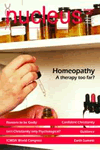What is truth? Can we ever really know what truth is? Why should 'your' truth be the only truth?
Have you ever been on the receiving end of such questions? Perhaps you've been caught up thinking these thoughts yourself. If so, welcome to postmodernism!
Think 'postmodernism' and what's the first thing that springs into your mind? To me the term conjured up a vague 'wishy-washy' worldview that can mean whatever you want it to. That was until I was given a copy of Meltdown - a concise and very well-written critique of postmodernism.
The book is a manageable size and by the time you get through the introduction any anxieties are abated. It is written in simple, understandable language by an author who clearly understands his topic. Marcus Honeysett is the London team leader of the Universities and Colleges Christian Fellowship (UCCF). He has done all the tough work of reading through the complex, and sometimes nonsensical, ideas of the most influential postmodern philosophers, making their theories accessible.
The introduction gives an insight into the nature of postmodern thought and how it has influenced the culture in which we live. This subtle theory is alive and active within our universities and is shaping the minds of many future 'movers and shakers'. Most importantly it denies the existence of both truth and God. As Christians we are challenged to understand and be able to speak against this philosophy and the culture it inspires.
The book then splits into two parts. In Part One we are introduced to some of the world's postmodern thinkers. Their ideas are summarised, and by means of case studies we are able to see just how they have affected the content of university courses. This section is as worrying as it is insightful. The reader cannot help but recognise the truth of the author's observations, making this essential reading.
In Part Two the gloves truly come off. We are shown just how much postmodern thought has invaded our own Christian life and influenced how we read the Bible, attend church and live under God's authority. This leads to a call to develop in ourselves a 'robust godliness' that can withstand this corrosive environment and enable us to proclaim the truth of the gospel to a culture that has no desire to hear it.
Reviewed by Richard Collins, a GP registrar in Bedford and former CMF staffworker































